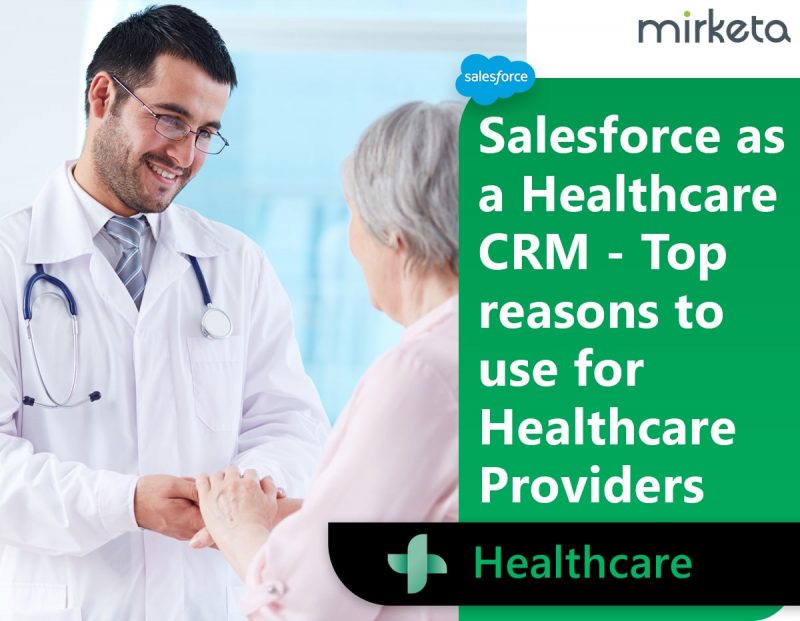The top CRM in the globe has a proven history of assisting companies in exceeding their sales targets. Since “sales” makes up half of its name, However, the methods in which Salesforce boosts selling—by personalizing interactions, fostering cooperation, and dismantling data silos—apply to more than simply sales.
The healthcare sector has begun to understand how effective a healthcare CRM can be since the launch of Salesforce Health Cloud in 2016. Salesforce improves patient-provider connections, aids in care team collaboration, and eventually leads to better health outcomes. The launch of the Vaccine Cloud also demonstrates Salesforce’s capacity for rapid adaptation and managing various healthcare use cases.

Let us look at the five justifications for why healthcare providers ought to adopt Salesforce as a CRM.
1. Link Silos of Systems
- If you are familiar with Salesforce, you are aware that breaking down data silos is the goal. Healthcare is hardly an exception; in fact, it could gain more than others from extensive linkages. The typical hospital employs sixteen different Electronic Health Record (EHR) systems, according to research by HIMSS Analytics.
- EHR systems are merely the start. Additionally, there are test results, billing and marketing data, insurance claims systems, and more to consider. Dispersed among numerous platforms, this richness of data is not useful.
- All of it relates to Salesforce. EHR data and other forms of data may be safely connected with Salesforce using Health Level 7 (HL7) APIs, and applications like MuleSoft Accelerator for Healthcare reduce the workload for healthcare IT teams.
2. Utilize Data Wisely
- Speaking of data, Salesforce can use its analytical prowess to enhance health results when it is incorporated into a single system. Healthcare professionals can anticipate and proactively address patient requirements with the help of tools like Tableau CRM (previously Einstein Analytics), which provides them with actionable insights. The right care management program can be enrolled for high-risk patients thanks to risk classification. Salesforce can get data from wearable devices like fitness trackers and help with post-discharge care for chronic diseases that need monitoring.
- In conclusion, Salesforce makes it simpler for healthcare professionals to make data-driven decisions that improve patient outcomes and provider-patient satisfaction.
3. Experiences That Are Customized
- Consumers demand individualized experiences everywhere they go, and this expectation does not just apply to the healthcare industry. Fortunately, healthcare providers can utilize Salesforce to customize each phase of the healthcare experience since they have access to a lot of data.
- Patient data cards and visual care timelines make it simple for contact center personnel to obtain pertinent information, allowing them to respond to patient concerns with more precise, personalized responses.
- By combining clinical data, such as medical history, and nonclinical data, such as social factors, in one location, personalized treatment plans can be developed. Additionally, the healthcare professional can take care of any specific needs a patient may have, such as a need for transportation, before the patient even mentions them.
- Furthermore, patient communication can always be managed in accordance with the patient’s preferences, whether it be through phone calls, messages, or an online Salesforce Communities site. The various customization options Salesforce provides can increase confidence, strengthen patient-provider bonds, and (as always) lead to better health results.
4. Improve Care Team Cooperation
- Healthcare practitioners can form Care Teams composed of members of a patient’s care community thanks to Salesforce Health Cloud, which expands on the capabilities of Service Cloud. These could be made up of specialists, primary care doctors, domestic helpers, or anyone else connected to a patient’s treatment. Individuals can use any device to view a unified care management plan, assign tasks, and communicate with other team members depending on their position (much like Salesforce Case Teams). Additionally, they can use Knowledge and Live Agent from the Service Cloud.
- Care Teams encourage cooperation and productivity among those tasked with maintaining the well-being and health of their patients. They benefit both patients and providers. a development in Salesforce and healthcare!
5. Maintaining Data Security While Continuing Innovation
- For healthcare businesses, data security is of the highest importance. Breach costs millions of dollars and can endanger patient safety. Fortunately, Salesforce makes it simple for healthcare organizations to keep control of their data and adhere to HIPAA and HITRUST regulations. Healthcare organizations may make sure that electronically protected health information (ePHI) is secured and only accessed by authorized users using Salesforce Shield in conjunction with Health Cloud. They can also keep track of user interactions and keep an audit trail of field data.
- Salesforce encourages innovation even though regulatory requirements are by their very nature restrictive. Healthcare organizations who are concerned about data security can add functionality thanks to the rich ecosystem of AppExchange solutions.
Conclusion
- Healthcare providers must run as effectively as they can while delivering excellent care. Salesforce Health Cloud makes this possible in a variety of ways, but the major advantage is that it offers a thorough, 360-degree view of the patient.
- This enables healthcare companies to deliver the caliber of service that contemporary patients want through the intelligent use of data at every stage of the care experience.
Leave A Comment